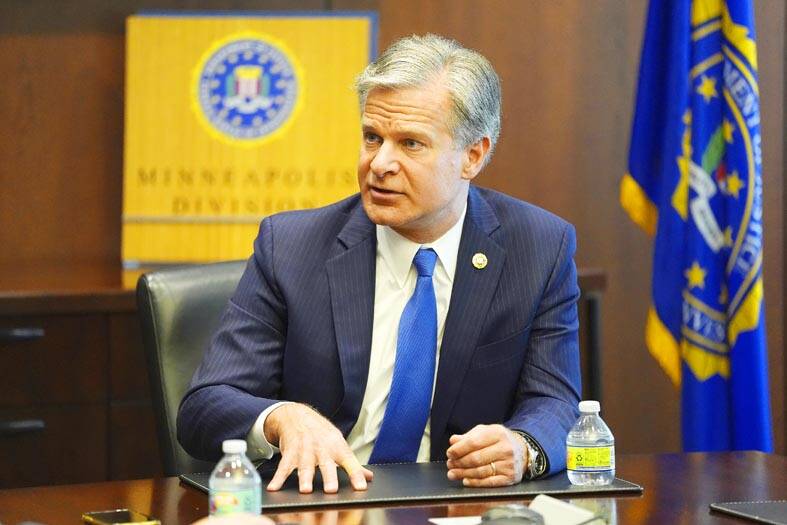The US is facing heightened threats from many corners at a time when law enforcement agencies are struggling, FBI Director Christopher Wray said in an interview on Wednesday, adding that he is “hard pressed to think of a time in my career where so many different kinds of threats are all elevated at once.”
Wray spoke with The Associated Press while visiting the FBI’s field office in Brooklyn Center, Minnesota, to talk about partnerships between law enforcement agencies and with other entities. His remarks come as the FBI confronts heightened concerns over terrorism, as well as Chinese espionage and intellectual property theft and foreign election interference.
“I worry about the combination of that many threats being elevated at once, with the challenges facing the men and women in law enforcement more generally,” Wray said at the office in the suburb of Brooklyn Center. “And the one thing that I think helps bridge those two challenges is partnerships. That’s how we get through. It is by all working together.”

Photo: AP
Wray’s assessment of an elevated threat landscape is consistent with alarm bells he has sounded for months.
Soon after the attack by Hamas in Israel on Oct. 7 last year, Wray began warning that the rampage could serve as an inspiration to militants, “the likes of which we haven’t seen since ISIS [the Islamic State group] launched its so-called caliphate years ago.”
The FBI has also scrambled to deal with security concerns related to the US’ southern border, with officials in June saying that eight people from Tajikistan with suspected ties to the Islamic State group were arrested and were being held on immigration violations.
Officials are also dealing with the specter of foreign election interference. The FBI and other federal agencies on Monday said that Iran was responsible for a hack targeting the presidential campaign of former US president Donald Trump and for an attempted breach of the campaign of US President Joe Biden and US Vice President Kamala Harris — which happened before Biden exited the race — part of what officials portrayed as a brazen and aggressive effort to interfere in US politics.
Wray declined to talk about any specific investigation or threat, but said that investigations into cyberattacks, including against election infrastructure, candidates or campaigns, require help from the private sector.
“One of the things that we have been doubling down on with every passing day is, is on partnerships, because ultimately you’re talking about the ability to connect the dots, whether it’s against some kind of election influence threat or some other kind of threat,” Wray said. “You need to have partners sharing information with each other to put the two pieces together to see the bigger picture.”
Law enforcement officers are being killed in the line of duty at a rate of about one every five days, Wray said, adding that four first responders have died in Minnesota alone so far this year.
They include a Minneapolis officer killed in May while trying to help someone, and two officers and a paramedic who died in Burnsville in February when a heavily armed man opened fire.
Such violence “breaks my heart every single time,” he said.

ANGER: A video shared online showed residents in a neighborhood confronting the national security minister, attempting to drag her toward floodwaters Argentina’s port city of Bahia Blanca has been “destroyed” after being pummeled by a year’s worth of rain in a matter of hours, killing 13 and driving hundreds from their homes, authorities said on Saturday. Two young girls — reportedly aged four and one — were missing after possibly being swept away by floodwaters in the wake of Friday’s storm. The deluge left hospital rooms underwater, turned neighborhoods into islands and cut electricity to swaths of the city. Argentine Minister of National Security Patricia Bullrich said Bahia Blanca was “destroyed.” The death toll rose to 13 on Saturday, up from 10 on Friday, authorities

Local officials from Russia’s ruling party have caused controversy by presenting mothers of soldiers killed in Ukraine with gifts of meat grinders, an appliance widely used to describe Russia’s brutal tactics on the front line. The United Russia party in the northern Murmansk region posted photographs on social media showing officials smiling as they visited bereaved mothers with gifts of flowers and boxed meat grinders for International Women’s Day on Saturday, which is widely celebrated in Russia. The post included a message thanking the “dear moms” for their “strength of spirit and the love you put into bringing up your sons.” It

DEBT BREAK: Friedrich Merz has vowed to do ‘whatever it takes’ to free up more money for defense and infrastructure at a time of growing geopolitical uncertainty Germany’s likely next leader Friedrich Merz was set yesterday to defend his unprecedented plans to massively ramp up defense and infrastructure spending in the Bundestag as lawmakers begin debating the proposals. Merz unveiled the plans last week, vowing his center-right Christian Democratic Union (CDU)/Christian Social Union (CSU) bloc and the center-left Social Democratic Party (SPD) — in talks to form a coalition after last month’s elections — would quickly push them through before the end of the current legislature. Fraying Europe-US ties under US President Donald Trump have fueled calls for Germany, long dependent on the US security umbrella, to quickly

In front of a secluded temple in southwestern China, Duan Ruru skillfully executes a series of chops and strikes, practicing kung fu techniques she has spent a decade mastering. Chinese martial arts have long been considered a male-dominated sphere, but a cohort of Generation Z women like Duan is challenging that assumption and generating publicity for their particular school of kung fu. “Since I was little, I’ve had a love for martial arts... I thought that girls learning martial arts was super swaggy,” Duan, 23, said. The ancient Emei school where she trains in the mountains of China’s Sichuan Province